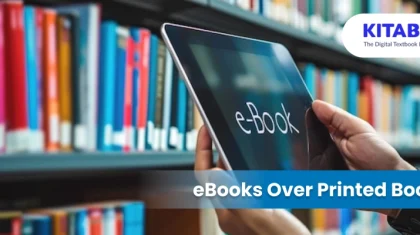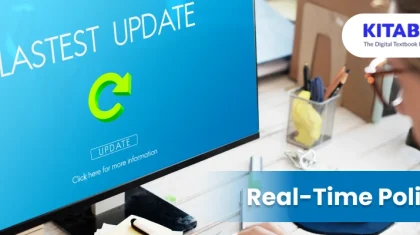
AI-Powered Personalized Learning: Tailoring Education to Individual Needs
Summarize this blog with your favorite AI:
Today, personalization has emerged as one of the top trends disrupting the business world. This practice involves customizing products and services based on a consumer’s unique preferences and needs.
One of the top outcomes of personalization is that it drives higher customer retention due to the relevance of products and services. The education sector is also embracing this trend, aiming to provide a more relevant learning experience for all students.
The global personalized learning market, valued at $1.8 billion in 2023, is projected to grow to a value of $19.86 billion by 2030, registering a high compound annual growth rate (CAGR) of 12.7%.
K12 publishers who embrace this trend early on can develop a competitive edge in a crowded marketplace. In this blog, we explore key strategies for helping educators personalize learner journeys and outline the key benefits of doing so.
Table of Contents:
I. What is Personalized Learning?
II. Top 9 Strategies to Craft Personalized Learning Journeys
- Introduce Modular Content
- Harness Interactive, Multi-Format Learning
- Introduce Self-Assessments
- Make all Content Accessible
- Design Mobile-First User Journeys
- Enable Multi-Language Learning
- Introduce Gamification Elements
- Automate the Personalization Process
- Harness the Power of Predictive Data Analytics
III. The Conclusion
What is Personalized Learning?
Personalized learning is the practice of customizing a learner’s entire user journey, from onboarding and learning modules to assessments and skills training. Educators leverage historical learner data to offer a highly customized experience.
This approach empowers students to learn at their own pace while absorbing and retaining knowledge more effectively. Today, educators can automate the entire personalization process, end-to-end, with the use of AI-powered solutions such as digital textbook publishing platforms such as KITABOO.
Today, personalization has emerged as one of the premier intelligent tutoring systems in the classroom due to its multiple benefits for both educators and learners, as follows:
- Personalized user experiences help make the learning journey relevant for students. Thus, educators can boost student engagement and retention.
- Educators can drive superior learning outcomes by adopting a data-driven education mechanism.
- They can also deliver an inclusive and equitable learning experience, and in turn, attract new audiences of diverse learners. For instance, personalization offers benefits for learners with disabilities, learning challenges, mobility, and language barriers.
Top 9 Strategies to Craft Personalized Learning Journeys
Here’s the time into nine strategies that equip K12 educators on how to craft an engaging, interactive, and personalized learning journey for their audiences.
Introduce Modular Content
Educators must break down the entire curriculum into modular-based content. Modular content refers to reusable, byte-sized nuggets of content which can be delivered across multiple channels, devices, and platforms.
This approach is much more consumable to today’s learners as compared to lecture-style learning and textbooks.
Harness Interactive, Multi-Format Learning
Students, today, learn via a diverse range of content formats based on their unique needs and preferences. Some of the most popular formats include videos, audio representations, slide shows, blogs, podcasts, 3D models, and eBooks.
Today, eBooks are moving towards being interactive, with videos, images, and widgets being embedded within the eBook.
K12 educators can also consider introducing immersive experiences with the use of Augmented Reality (AR) and Virtual Reality (VR). The use of multi-format learning enables learners to absorb and retain concepts and the fundamentals much faster.
Introduce Personalized Self-Assessments
Traditional education hosts assessments at larger intervals, such as every semester. However, personalized learning has completely disrupted this timeline with the practice of self-assessments.
Learners can take self-assessments, which are automatically generated using machine learning algorithms based on real-time learner data. The frequency of assessments is high. Learners can test their proficiency. They can cultivate mastery over their subject through automatically generated practice sessions.
Make all Content Accessible
A personalized learning experience must also cater to learners’ accessibility needs. For instance, learners with visual, hearing, mobility and motor challenges must be able to access and engage with all content.
Accessibility tools and techniques enable K12 educators to be relevant to underserved learners. Examples include video captions and subtitles, text transcripts of all videos, alt text, integration of screen readers, ability to adjust screen brightness, font size and font type, and text-to-speech capabilities.
Enable Multi-Language Learning
Another key aspect of a personalized learning journey is access to multiple language capabilities. If learners have access to the language of their choosing, they can absorb and retain knowledge much faster.
Contemporary publishing solutions enable the speedy and efficient translation of content into multiple languages. A key advantage is that they can easily translate into languages with a right-to-left script. Thus, educators can bring more diversity and inclusion into their learning journeys.
Design Mobile-First User Journeys
As more learners can access mobile phones, educators must consider optimizing all user journeys for mobile-based learning.
Mobile-first user journeys are best aligned with a personalized learning strategy due to the combination of convenience, flexibility, and accessibility provided by this dual learning mode.
This strategy capitalizes on the trend of micro-learning, a practice in which students learn and perfect a concept for a few minutes at a time.
Introduce Gamification Elements
The introduction of gamification elements such as rewards, challenges, and leaderboards makes the entire learning process more competitive and engaging. Educators can further customize the gamification process by curating diverse rewards and learning-based challenges.
Automate the Personalization Process
Manual interventions in personalization prevent K12 educators from scaling their operations. Automation can address this challenge.
By adopting an AI-powered digital textbook publishing platform, education providers can personalize learner journeys at scale.
User journeys are automatically personalized within minutes, without any human intervention. This capability enables K12 educators to scale quickly and efficiently.
Harness the Power of Predictive Data Analytics
By using predictive Data Analytics, educational providers can access deeper insights into learner behavior, preferences, and progress. They can understand learning gaps and stay abreast of larger learning trends.
Additionally, educational providers can also forecast future performance, strengths, and weaknesses, based on historical data. This capability further enables them to elevate the level of personalized learning and drive superior learning outcomes.
The Conclusion
Today’s learners come with a wide range of unique needs, proficiencies, and preferences. By introducing personalized learning, K12 educators can attract a diverse cohort of learners. They can offer a more relevant learning experience, and boost student engagement and retention.
If you are a K12 educator or digital learning program looking to revamp the user journey, making it more relevant, you need access to AI-based technology to power this transformation.
KITABOO’s AI-powered digital textbook publishing platform automates the personalization process and comes with superior predictive data analytics that paves the way for high-impact programs.
Connect with us now to start a conversation.
Also Check:
Discover how a mobile-first training platform can help your organization.
KITABOO is a cloud-based platform to create, deliver & track mobile-first interactive training content.



